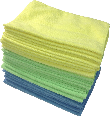There are times when, no matter how hard we try, calcium deposits simply "appear" on our cookware. Most often this phenomenon is noticed on stainless steel cookware. There are several methods that you can use to help in removing calcium deposits from cookware, though most of them require that you think outside the box a little bit. In fact, some of them may even seem a little counter intuitive, but they do work.
While these methods will work for a vast majority of calcium deposits, there is a chance that they won't as well. That situation is usually due to the metal becoming so pitted from use that there really isn't anything that you can do to restore the damaged steel pot. It is best to avoid such a situation by preventing it from happening at all. Do this by being careful with the amount of salt that you use in your cooking, and if at all possible avoid adding salt at all. If you do need to add any salt, only add it after the water has stopped boiling.

The Power of Microfiber! Zwipes Microfiber Cleaning Cloths will become your favorite tool for every cleaning task. This 36-cloth package is perfect for hundreds of uses in the garage, kitchen, bathroom, laundry, and all around the house. Each cloth is tough, streak-free, lint-free, reusable, and washable. Check out Microfiber Cleaning Cloths today!
A dishwasher is a great tool, but it can't do the tough job of scouring off food stuck to dishes. Soaking these dishes in ...
Discover MoreWhile plastic containers are wonderful items to use around the kitchen, there are generally a couple of problems with ...
Discover MorePyrex is one of the most popular and enduring choices for cooking and baking ware. While this popularity is largely due ...
Discover MoreFREE SERVICE: Get tips like this every week in Cleaning Tips from Tips.Net. Enter your address and click "Subscribe."
There are currently no comments for this tip. (Be the first to leave your comment—just use the simple form above!)
FREE SERVICE: Get tips like this every week in Cleaning Tips from Tips.Net. Enter your address and click "Subscribe."
Copyright © 2026 Sharon Parq Associates, Inc.
Comments